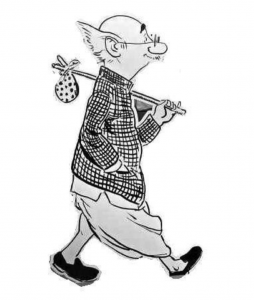Previously in the The Global Farmer ‘ I posed the question Is China to Australia what Russia is to Europe?’ I discussed Australia’s reliance on China for being by far Australia’s biggest export market. The heavy burden of dependence...
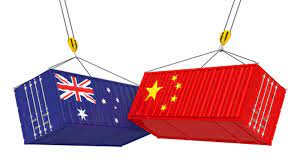 Previously in the The Global Farmer ‘ I posed the question Is China to Australia what Russia is to Europe?’ I discussed Australia’s reliance on China for being by far Australia’s biggest export market. The heavy burden of dependence that the economy of Australia places on its mining industries is not often talked about by the majority of Australians. Maybe that is because it can cause a few uncomfortable thoughts, mainly what would happen if China stopped buying from Australia? What would be far worse though, is what would happen if China stopped supplying Australia?
Previously in the The Global Farmer ‘ I posed the question Is China to Australia what Russia is to Europe?’ I discussed Australia’s reliance on China for being by far Australia’s biggest export market. The heavy burden of dependence that the economy of Australia places on its mining industries is not often talked about by the majority of Australians. Maybe that is because it can cause a few uncomfortable thoughts, mainly what would happen if China stopped buying from Australia? What would be far worse though, is what would happen if China stopped supplying Australia?
The Five Eyes nations gather and share intelligence from around the world.
A study by a UK think tank, the Henry Jackson Society, last year examined the dependency of the Five Eyes countries—the US, the UK, Canada, Australia and New Zealand— on China and found that Australia was by far the most exposed. The Strategist.
Europe is Exposed and it Hurts.
The political leaders in Europe, when they signed up to be reliant on Russia for fossil fuels, they gambled the welfare of some 400 million people and their industries, on being treated ‘properly’ by the communist Vladimir Putin and his Russia.
Europe knew full-well what Putin was like, they must have calculated the odds; they knew the character of the man and what he was capable of, but they trusted him just the same. Now Europe is being forced to accept a high price for trusting an ex KGB officer who became the ruler of the biggest country in the world.
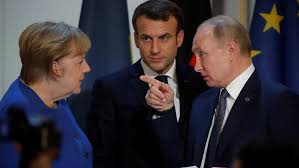 Merkle. Macron. Putin.
Merkle. Macron. Putin.
Why Angela Merkle of Germany, Emmanuel Macron of France and the leaders of the other 25 countries in the EU trusted Putin, only they know. Apart from the Balkans War in the nineties there hasn’t been a major war in Europe for eighty years or so, but Europe knows war, it is written deep in their history, it is as if it is in their DNA.
Europe knew, but decided to forget, what Putin and Russia had done in Syria when supporting Bashar al-Assad, a dictator that should be tried for war crimes. The Russians claimed they bombed and killed 85,000 Syrians and others, including thousands of men, women and children, all innocent non-combatants. Before Syria Putin killed thousands in Afghanistan in what turned out to be a failed attempt to conquer that country.
Europe’s leaders turned a blind eye to Putin’s annexation of Crimea in 2014 and his overt, arrogant encouragement, of the rebel army in East Ukraine, who were and still are, intent on overthrowing the Zelensky government with arms and equipment and training supplied by Russia. Then when Putin invaded Ukraine and hot war broke out, Europe didn’t know what to do.
Overnight the those smug leaders of Europe found their purchases of fossil fuels from Russia were funding an invasion of another European country, a country which, just a few weeks previously had applied to join them in the European Union and to be part of their NATO Alliance. They were funding a war on their own people. (In the first 100 days of the war the EU imported fossil fuels from Russia worth €57 billion A$87 billion)
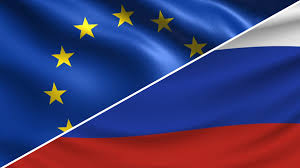 Is China to Australia what Russia is or was to Europe?
Is China to Australia what Russia is or was to Europe?
Has Australia considered the consequences to the national economy if China invades Taiwan and the world places punitive sanctions on China the same as it has placed on Russia? Australia would have to stop exporting to China.
If that happened China would ban the export of all goods to Australia including those essential to the Australian economy.
Has Australia, like Europe with Russia, ever considered China and it’s barbaric record on human rights? Because it is equally as bad if not worse than that of Russia.
Start with China’s violent annexation in1950 of Tibet. The subsequent destruction of thousands of monasteries and forcing of the Dali Llama into exile in India. It is claimed over 1 million Tibetans have died at the hands of the Chinese army. The forced sterilization of women was denied by China.
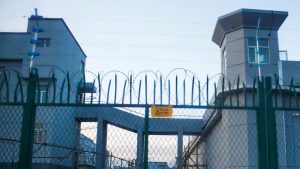 China calls this site in Dabancheng, Xinjiang, a vocational skills education centre. Picture Sky News UK.
China calls this site in Dabancheng, Xinjiang, a vocational skills education centre. Picture Sky News UK.
Claims of genocide against the Uighur nation and the putting down of their religion are now proven. As is the harvesting of body parts and the forced communist indoctrination of their children. It is claimed that over 2 million Uighurs are ‘detained’ by the PRC, many of them in camps reminiscent of the worst of those built by the Gang of Four during the cultural revolution, or the Gulags built in Siberia by Stalin to hold his political enemies.
Is China’s attitude to Taiwan any different to the way Putin views Ukraine? Who can forget the protest in Tienanmen Square and the subsequent disappearance of thousands of students? The flagrant, dismissive arrogant breaking of the agreement with Britain over Hong Kong?
Australia, like Europe, has made the decision that human rights are less important than trade. In Europe’s case it decided to rely on Putin for the majority of its fossil fuel needs because the price was right, they were easily transportable and it fitted in with Europe’s views that in the EU they are just one big happy family and all things should be shared.
Australia is little different. When the mining boom started back in the eighties, it was almost in concert with China’s ambitions to replace America in the world order of trading nations. To do that it needed steel and coal and Australia had both in abundance. Other products of the mining industry followed as did Australia’s ‘clean and green’ food. Australian industry, intellectual property and tens of thousands of manufacturing jobs moved to China. Trade between Australia and China grew and continues to grow every year.
‘Made in China’ is no longer considered a label of inferior product. Australia’s dependence on China demanded that their violation of human rights was not mentioned in polite society. It was brushed under the diplomatic carpet and, as we are now experiencing, any transgression by Australia, like asking questions about the origin of Covid19 is answered with brutal and disproportionate trade embargoes and a severing of contact between Ministers.
China preferred diplomacy is conducted by their ‘Wolf Warriors’, who say what they like, where they like, knowing full well there will be no response from Australia, because the stakes are far, far too high.
Now we need to consider what will happen to Australia and its economy if there is breakdown in trade between China and Australia?
In 2020 Australia Imported from China goods worth a staggering A$86.0 billion.
That is equivalent to $7 billion a month or ~$2 billion every week of manufactured goods arriving in Australia from China. Presumably this is the FIS value (Free Into Store) The retail value, or the value to the economy would be about double, so ~$172 billion.
That is a quote from my article about Europe’s reliance on Russia which went on to examine, to question just how reliant, how dependent Australia is on China, especially for those goods that are essential to every day life in the home and in commerce? At the time I couldn’t find the statistics to compare the strategic importance of what Australia imported from China, with what it imported from other countries, so I couldn’t decide ‘how’ dependent Australia is on China.
What did concern me at the time was the sheer size of the imports from China, the tens of billions of dollars of goods arriving in Australian ports every day of every week fifty two weeks of the year.
The statistics that I needed to determine how dependent Australia is on China are now available, they are a couple of years old; that doesn’t matter because imports from China are growing year on year, so the 2022 figures are bigger than those quoted here from 2018.
Five Eyes for Security.
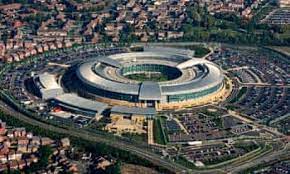 GCHQ the home of British intelligence services
GCHQ the home of British intelligence services
The Five Eyes Group, UK, Australia, New Zealand, Canada and United States, share intelligence from around the world, all continents are covered. Of recent times the tensions in the South China Sea and the Pacific Ocean would have been of particular interest to the Five Eyes nations.
The Covid 19 pandemic caused all five countries to examine their supply-chain vulnerability. For instance Australia got badly caught out when it found it didn’t have sufficient protective clothing and other vital supplies like breathing apparatus, needed to manage the medical emergency that developed during the Covid pandemic. Many if not all the supplies that Australia found itself short of came from China. America had the same problem. It needed a pandemic for the Five Eyes nations to realise how important China had become as the supplier of critical goods to them and to the world.
When governments became aware that China had cornered the market for an extensive range of medicines particularly antibiotics, questions were asked about how did China make itself the major and in some cases the only supplier to the world of critical medicines?
To add to the dilemma, Australia’s friction with the Chinese government is well known, the temperature increased recently when the Chinese air force put an RAAF surveillance aircraft in danger over the South China Sea. The Australian Government at the time reacted and so too did the Chinese, as always each blamed the other and the mercury went up a point or two.
In spite of diplomatic incidents which are of news value to the world, behind the scenes Australia’s imports from China have continued to grow strongly.
Dependence and Reliance.
A study by a think tank in the UK the Henry Jackson Society, last year had a look at the dependence of the Five Eyes countries — Australia, UK, America, Canada and New Zealand on China; they found that Australia was by far the most exposed.
The study used United Nations data, which divides global trade into 99 industries, with each industry having 99 sectors and each sector 99 categories of goods.
The study applied three tests to establish whether a country was strategically dependent on China: the country had to be a net importer of the goods in question, more than half its imports of the goods had to come from China, and China’s global market share of those goods had to be greater than 30%. The tests meant that in the event that supplies from China were interrupted, it would be difficult for the importing nation to replace them.
It found that of the 5,914 categories of goods imported by the five nations, Australia was strategically dependent on China for 595, which was more than any other country.
Each of the five nations has identified critical industries, including communications, energy, health, transport, water, finance, critical manufacturing, emergency services, food and agriculture, information technology and government facilities.
Australia was dependent on China for more than half the supplies to three industries, 37 sectors and 167 categories. This was by far the greatest level of dependency among the five nations.
There is a separate analysis on Australia’s dependency on China compiled by David Uren from the Strategist and it makes for sobering even alarming reading for anyone with an interest in Australia’s security and its dependence on China.
Is there a similarity between Europe’s dependence on Russia for fossil fuels and Australia’s dependence on China for essential goods?
The sobering facts are that China provides 86% of all Australian semi-conductor imports, 75% of all lighting, 72% of generators and 68% of computers. Forty per cent of all nuts and bolts 100% in some categories. Australia is 100% dependent on China for manganese vital in the manufacture of stainless steel and other alloys. Sixty two percent of all imported radio and television transmitters worth $5 billion in 2018 were made in China. Australia depends on China for 80% of aluminium parts/structures for construction. Fifty seven per cent of insulated wire and cable, optical fibre cable and nearly 50% of TV receivers. Similarly, 73% of soldering irons and 70% of resistance welding machines are imported from China. The list is long and in many ways frightening.
As if all that isn’t bad enough Australia is dependent on China for its supplies of important medical equipment and pharmaceutical goods; 69% of all penicillin and its precursors, 72% of certain categories of steel sanitary ware, 73% of spectacles and protective goggles, 85% of all first aid kits, the list goes on.
The list compiled by David Uren on what Australia imports from China is long and detailed; it is deserving of careful consideration and demands discussion at all levels of society and government. Australia’s dependence on China challenges it’s future as a sovereign independent nation.
The report by the Henry Jackson Society and David Uren show a deep flaws in Australia’s supply chain and in too many cases identified an almost total reliance on China for essential supplies, supplies which they claim, would be difficult to replace from other sources.
There is very little that Australia buys from China which could not be ‘Made in Australia’ by Australians.
We need China more than they need us.
Australia has no reason to believe that its exports to China cannot be replaced from other sources. Brazil has vast quantities of iron ore, not quite the quality of that from Australia but good non the less. Brazil has also been building a fleet of huge iron ore carriers in an attempt to lower the transport costs between Brazil and China, an edge that Australia enjoys.
China, together with Rio Tinto and the Government of Guinea, are developing a big high quality ore deposit in West Africa, which is due to come on stream within twelve months or so. India, who has vast reserves, has also been selling iron ore to China.
China is Australia’s biggest customer for natural gas (LNG). Again Australia has a freight advantage over other suppliers, but here is no shortage of gas in the world and what China wants China will get, no doubt the Gulf Countries would oblige if asked, and of course there have been rumours that China will take all the oil and gas that Russia can supply.
China Holds all the Cards.
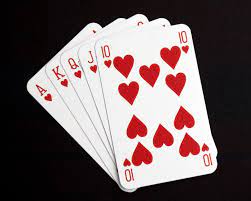 China holds all the cards as far as trade with Australia is concerned. If China slowed or stopped importing from Australia and at the same time slowed or stopped supplying Australia with those goods that are essential to its everyday life, the economy of Australia would quickly collapse.
China holds all the cards as far as trade with Australia is concerned. If China slowed or stopped importing from Australia and at the same time slowed or stopped supplying Australia with those goods that are essential to its everyday life, the economy of Australia would quickly collapse.
China has given Australia and the Five Eyes nations a sobering demonstration of the benefits of long-term strategic thinking, planning and execution. The success of China’s global ambitions and the realpolitik behind it’s strategy over the last twenty years or so, has shown the world how the Chinese seduced the West. How they ‘obtained’ its intellectual property. How they persuaded the West to export technology and essential industries together with thousands of jobs to China, all in return for cheaper good, higher profits, better balance sheets and bigger dividends for shareholders. Their seduction of the industrial titans of the West was finely planned and slowly and deliberately executed with a finesse seldom seen in the West.
The challenge for Australia.
Prime Minister Bob Hawke in 1990, when presenting the Australia Prize, talked passionately about his ambition for Australia to become a clever country, this is part of his speech:
‘AUSTRALIA PRIZE
CANBERRA 14 MAY 1990 awarded to: Agriculture or the environment theme – Allen Kerr, Eugene Nester and Jeff Schell
Perhaps you can draw some comfort from the fact
that the recent elections saw, for the first time, science
discussed as an issue in its own right. At the time, I
argued that for Australia’s future it was essential that we
should no longer be content to be just the lucky country;
that we must also become the clever country. That sentiment struck a very receptive chord in the community. The reason it did was not because it was some catchy slogan that offered hope in difficult times. Rather it reflected a genuine belief among Australians that if we are to maintain our place in the first rank of the developed nations we must embrace, and embrace enthusiastically, a culture in which science and technology are vital elements.
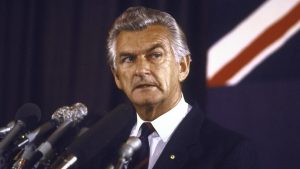 Bob Hawke Photo: The Australian
Bob Hawke Photo: The Australian
Thirty years on we find that Australia has largely failed to realise Bob’s ambitions, even worse it is dependent on China for critical supplies, which research has shown cannot be easily replaced from other sources.
Anthony Albanese need look no further, if he wants to make Australia secure all he has to do is read Bob Hawke’s speech heed the warnings from The Henry Jackson Society and the Australia Strategic Policy Institute and get then the wheels of industry in Australia turning and in so doing give his idol Bob, up there on his cloud, something to smile about.
© Roger Crook.



